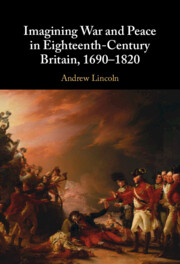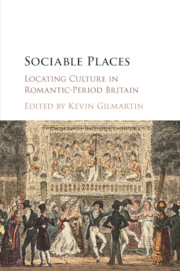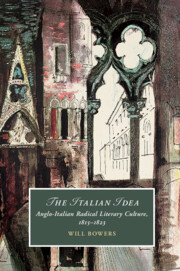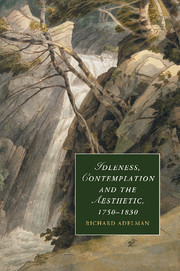Imagining War and Peace in Eighteenth-Century Britain, 1690–1820
$110.00 (F)
- Author: Andrew Lincoln, Queen Mary University of London
- Date Published: November 2023
- availability: Available
- format: Hardback
- isbn: 9781009366540
$
110.00
(F)
Hardback
Other available formats:
eBook
Looking for an examination copy?
This title is not currently available for examination. However, if you are interested in the title for your course we can consider offering an examination copy. To register your interest please contact [email protected] providing details of the course you are teaching.
-
Ranging over political, moral, religious, artistic and literary developments in eighteenth-century Britain, Andrew Lincoln explains in a clear and engaging style how the 'civilizing process' and the rise of humanitarianism, far from inhibiting war, helped to make it acceptable to a modern commercial society. In a close examination of a wide variety of illuminating examples, he shows how criticism of the terrible effects of war could be used to promote the nation's war-making. His study explores how ideas and methods were developed to provide the British public with moral insulation from the overseas violence they read about, and from the dire effects of war they encountered at home. It shows, too, how the first campaigning peace society, while promoting pacificism, drew inspiration from the prospects opened by imperial conquest. This volume is an important and timely call to rethink how we understand the cultural and moral foundations of imperial Britain.
Read more- Reveals how ideas about war are conditioned by the peaceful needs of society, and vice versa
- Ranges widely over the long eighteenth century, noting changes in attitudes to war and in the composition of the British public, allowing readers to compare a variety of responses to war and the factors that influence them
- Provides discussion of theoretical issues and close engagement with particular examples in an engaging and easy-to-follow style, making complex and sometimes counter-intuitive issues accessible to readers with no prior knowledge of the subject
Reviews & endorsements
‘Lincoln’s book has at its heart a fascinating question: how do eighteenth-century Britons manage at the same time to see themselves as increasingly civilized and as almost perpetually committed to war? In clear, strong prose, Lincoln moves across the long eighteenth century, tackling both a wide range of literary texts and other cultural works including philosophy and journalism and treating both hypercanonical authors (such as Austen) and texts clearly deserving more attention (Richard Glover’s Leonidas). Avoiding a reductive binary between war and civilization, he provides a panoramic view of how Britons thought about war and dreamed of peace.’ Jeffrey Cox, Distinguished Professor of English and Humanities, University of Colorado, Boulder
See more reviews‘In this rich and expansive study, Lincoln shows that eighteenth-century writers responded to the moral dilemmas posed by modern warfare with a wide range of caveats and compromises, strategies and solutions. Lincoln is an immensely knowledgeable guide to eighteenth-century writing about war, and this fascinating book makes an important contribution to scholarship in the field.’ Julia Banister, Senior Lecturer in English Literature, Leeds Beckett University
Customer reviews
Not yet reviewed
Be the first to review
Review was not posted due to profanity
×Product details
- Date Published: November 2023
- format: Hardback
- isbn: 9781009366540
- length: 300 pages
- dimensions: 235 x 155 x 20 mm
- weight: 0.64kg
- availability: Available
Table of Contents
I. Developing Ideals:
1. The Culture of War and Civil Society, from William III to George I
2. War and the Culture of Politeness: The Case of The Tatler and the Spectator
3. Sacrifice: Heroism and Mourning
4. Sacrifice: Christian Heroes
II. Developing Questions:
5. War and the 'Elevation' of the Novel
6. War and the 'Science of Man'
III. War and Peace in an Age of Revolutions:
7. Complicities in the Novel
8. Saving Individual Virtue
9. Saving Communal Virtue
10. The ideal of Non-resistance
IV. The Landscape of Conquest:
11. A Case Study: Gibraltar.
Sorry, this resource is locked
Please register or sign in to request access. If you are having problems accessing these resources please email [email protected]
Register Sign in» Proceed
You are now leaving the Cambridge University Press website. Your eBook purchase and download will be completed by our partner www.ebooks.com. Please see the permission section of the www.ebooks.com catalogue page for details of the print & copy limits on our eBooks.
Continue ×Are you sure you want to delete your account?
This cannot be undone.
Thank you for your feedback which will help us improve our service.
If you requested a response, we will make sure to get back to you shortly.
×





